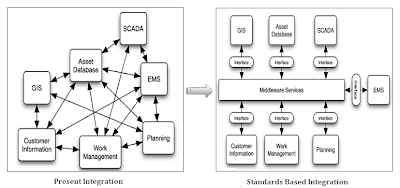In any integrated energy delivery utility operation model, there are different functional modules like GIS, Billing & metering solution, ERP, Asset management system that are operating in parallel and supports routine operations. Quite often, each of these functional modules need to exchange periodic or real time data with each other for assessing present operation condition of the network, workflows and resources (like crew, assets, etc). Unlike other power system segments, distribution system changes or grows every day, and this could be due to the addition of a new consumer, a new transmission line or replacement of equipment. If the different functional modules are operating in a non-standard environment and uses custom APIs and database interfaces, the engineering effort for managing shall become too large. Soon it will become difficult to manage the growing changes and additions which would result in making system integrations non- functional. Hence utilities cannot make use of the complete benefit of functional modules and in some cases; the systems may even need to be migrated to suitable environments with very high costs.
As these problems came to light, various standardization processes for inter application data exchanges were initiated. It was understood that a standard based integration shall ease the integration with other functional modules and that it also improves the operational performance. It ensures that the utility can be in a vendor neutral environment for future expansions, which in turn means that the utility can easily add new functional modules on top of existing functionality and easily push or pull the data effectively without having new interface adapters.
Know more about DMS & Kalkitech's end to end DA/DMS Solutions at: http://kalkitech.com/offerings/solutions-dms_offerings/

Standard-based integration is crucial in a Distributor Management System (DMS) to ensure seamless communication between different systems. It enables efficient data exchange, simplifies workflows, reduces manual errors, and facilitates collaboration between distributors and management. With standard-based integration, businesses can achieve streamlined operations, enhanced productivity, and better decision-making capabilities.
ReplyDelete